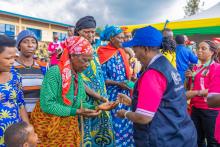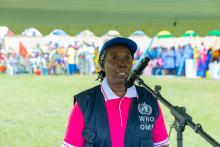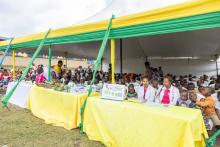‘No woman should die giving life’ – Rwanda maintains focus on maternal and child health
Rubavu, Rwanda – It all begins in the womb of a mother-to-be as she embraces the tiny being forming inside her. The sound of a much-awaited and priceless heartbeat. The feeling she gets at that first kick of life.
For many, the journey to motherhood is a source of excitement, joy, and love. But with 203 Rwandan mothers reportedly dying per 100,000 live births, childbirth has become a great risk.
For this reason, the Government of Rwanda has solemnly declared, ‘No woman should die giving life: Nta mubyeyi ukwiye gupfa abyara!’
Not only is this a powerful declaration, but it is also the theme for this year’s Maternal Child Health (MCH) week.
This resounding proclamation echoed through the Rwandan communities as the Ministry of Health (MoH) launched a week dedicated to the health and well-being of mothers and children.
Supported by the World Health Organization (WHO) and several development partners, commemorations kicked off in the north-western district of Rubavu on Monday, 14 November, with events scheduled to run across the country until 18 November 2022.
Speaking to a crowd of over a thousand women, men, adolescents, and children, the Ministry’s Head of the Department for Planning, Monitoring and Evaluation, Dr Parfait Uwaliraye said the government continues to prioritize the health of all women and children.
“Though the country has made steady progress, Rwanda still bears a heavy burden of high neonatal, infant, under-five, and maternal mortality. MCH week seeks to address this by strengthening the health system for all mothers, newborns, infants, and adolescents in the Rwandan community,” he shared.
Dr Uwaliraye further urged all mothers to change their attitudes and attend antenatal care at health facilities, as home-based deliveries are resulting in increased deaths during childbirth.
Rwanda continues to employ a combination of strategies to strengthen the health system and make the quality of services accessible to all mothers and children. For example, the Ministry’s adoption of the new WHO Antenatal Guidelines, recently launched in September 2022, to improve the quality of antenatal care and provision of a positive pregnancy experience.
However, as in most sub-Saharan African countries, Rwanda still contends with high maternal mortality figures. As with maternal deaths, neonatal deaths are equally of concern estimated at 19 per 1000 live births. Under-five mortality stands at 50 per 1000, while infant mortality stands at 33 per 1000 live births according to the Demographic Survey 2019-2020.
To this end, Rwanda implements maternal and child health week twice a year to deliver an integrated package of cost-effective preventative services to improve maternal and child health. MCH week also looks at providing interventions for Neglected Tropical Diseases (NTDs) and nutrition.
“The United Nations congratulates the Ministry of Health for prioritizing the health of women, newborns, and children,” said the WHO Reproductive Maternal and Neonatal Health Specialist, Dr Theopista Kabuteni, speaking on behalf of the United Nations (UN) agencies in Rwanda at the same event.
She concluded: “An integrated MCH week like this will ensure no child or mother is left behind. Let us take this opportunity to reach many women and children with health services catch-up, particularly the hard-to-reach and the most vulnerable. You can rest assured that the UN will continue to support the Government of Rwanda in ensuring access to health for all and building a healthy and prosperous nation.”
Rwanda equally commemorated Global Handwashing Day and World Toilet Day, events usually celebrated annually on 15 October and 19 November respectively. To mark these days, the Ministry of Health partnered with UNICEF and WHO to launch a two-year National Hygiene and Sanitation Campaign to promote safe sanitation and hygiene behaviors throughout the country.
Activities planned for this MCH week include screenings of malnutrition for children of six months to five years, provision of Vitamin A supplementation to children of the same age group, and deworming tablets to children aged 1-15 years. In addition, there will be catch-up vaccination sessions for children up to 5 years who missed routine immunization doses. Contraceptive services will equally be provided.
Furthermore, sessions will be held around malaria, nutrition, handwashing, water and sanitation, and their relation to maternal and child health. During all events, pregnant women will be encouraged to attend the recommended antenatal care visits at their nearest health facilities.
MCH week demonstrates Rwanda’s continued efforts to target issues impacting maternal and child health and ensuring that no woman dies giving life.





